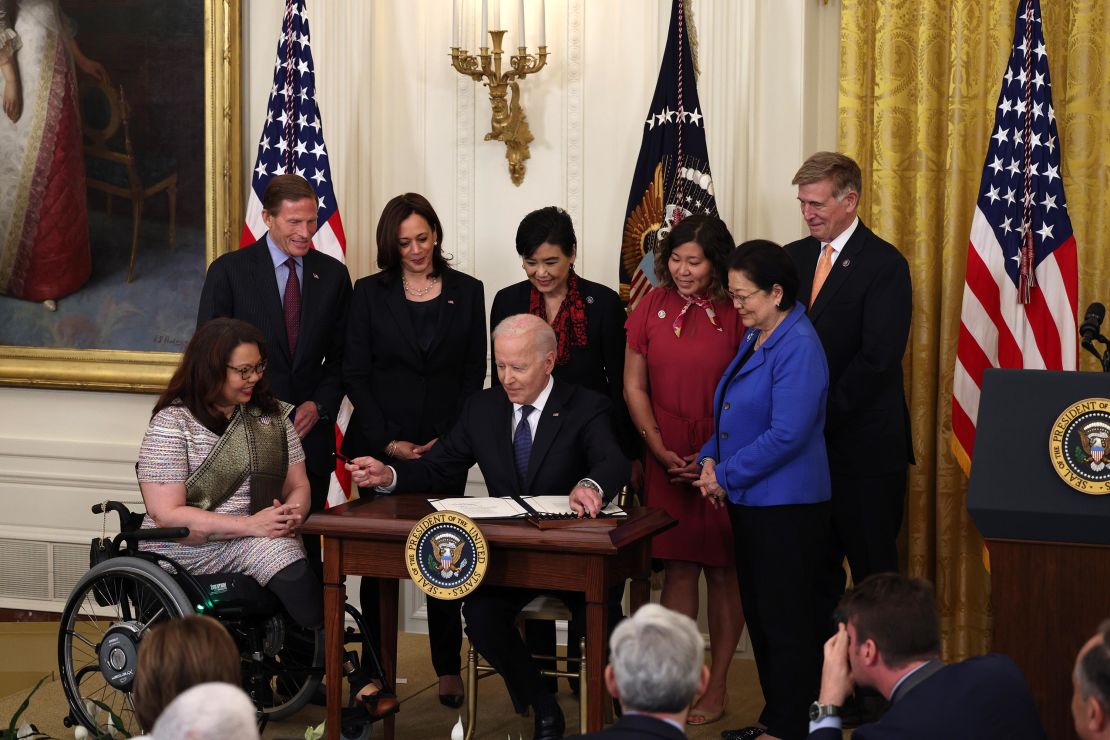Two Democratic lawmakers are urging the Justice Department to swiftly implement a federal law aimed at countering the rise in anti-Asian hate crimes during the coronavirus pandemic.
In a letter sent to Attorney General Merrick Garland, Sen. Mazie Hirono of Hawaii and Rep. Grace Meng of New York highlighted provisions of the Covid-19 Hate Crimes Act that are “critical to its effectiveness” and said the agency should pay attention to them.
“Full implementation of the COVID-19 Hate Crimes Act will help stem the tide against further violence,” they said in the letter on Monday.
The letter comes weeks after the FBI released its annual hate crime statistics report showing that more than 10,000 people reported to law enforcement last year that they were the victim of a hate crime because of their race or ethnicity, sexual orientation, gender, religion or disability.
The Covid-19 Hate Crimes Act was signed into law in May. The legislation, sponsored by Hirono and Meng, directed the Justice Department to expedite the review of potential Covid-19-related hate crimes and incidents reported at the federal, state or local level.
The bill also directs the Justice Department and Health and Human Services to work with community-based organizations to issue guidance raising awareness of hate crimes during the pandemic, and requires the attorney general to issue guidance for state and local law enforcement agencies on how to establish an online reporting system. Hirono and Meng highlighted those provisions in their letter.
A Justice Department spokeswoman confirmed receiving the letter but did not provide further comment.

Garland previously announced a series of steps intended to help the Justice Department implement the Covid-19 Hate Crimes Act, including assigning a deputy associate attorney general to coordinate anti-hate crime resources.
He appointed Rachel Rossi, a deputy associate attorney general, as the agency’s hate crimes coordinator, and designed the criminal section chief in the civil rights division to facilitate an expedited review of hate incidents in accordance with the Covid-19 Hate Crimes Act.
This fall, the department is expected to distribute several grants to state, local and tribal law enforcement agencies “to conduct outreach, education, investigations and the prosecution of hate crimes,” the agency had said in a news release.
While Hirono and Meng praised Garland’s efforts, the lawmakers said they are worried that “hate-based violence” will continue as Covid-19 variants lead to restrictions and “frustration with the virus will undoubtedly resurface.”
Last month, Asian American leaders raised similar concerns in anticipation of the release of a report on the origins of the Covid-19 virus.
While the “dangerous rhetoric” and anti-Asian remarks from US officials have diminished since Biden took office and the President has showed his support to the AAPI community, leaders said the harsh language against China can still bring hate toward Asian Americans.
A recent report by Stop AAPI Hate indicates that more than 9,000 reports of bias have been made since the beginning of the Covid-19 pandemic. The coalition said 4,533 of those incidents took place in the first six months of this year.
The organization has previously said it doesn’t independently verify any of the reports it receives, but that its total number of incidents only includes those reports that came with a description.
The majority of the incidents – about 63.7% – were cases of verbal harassment, while shunning or avoidance made up about 16.5%. About 13.7% of the incidents involved physical assaults, according to Stop AAPI Hate.



